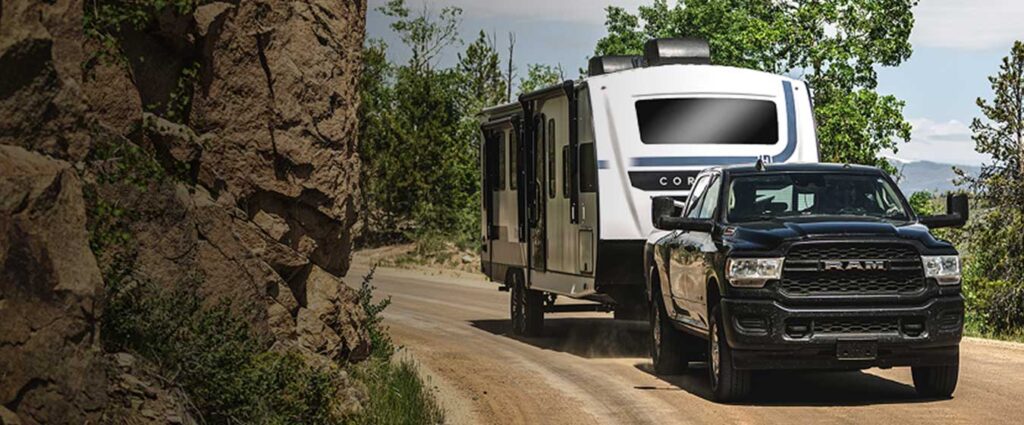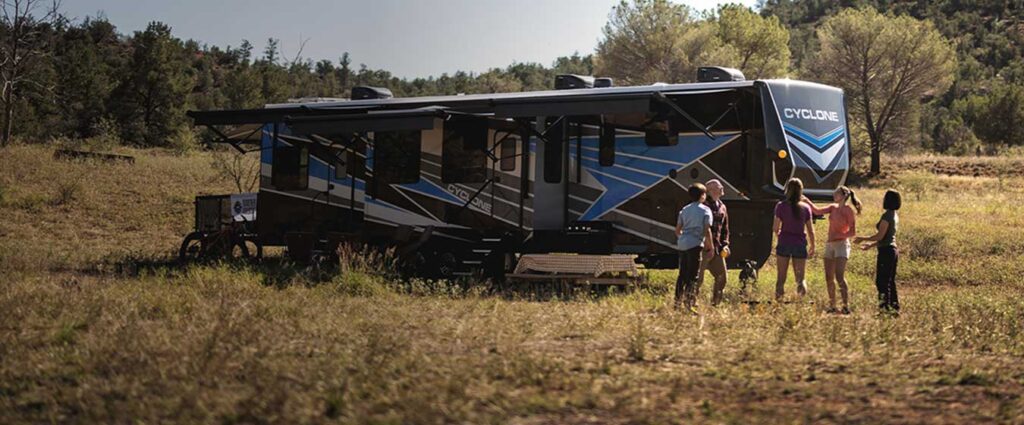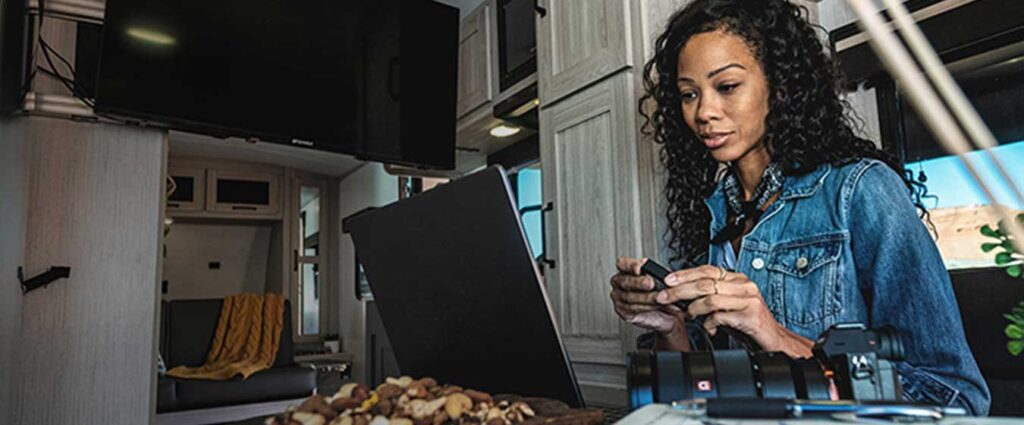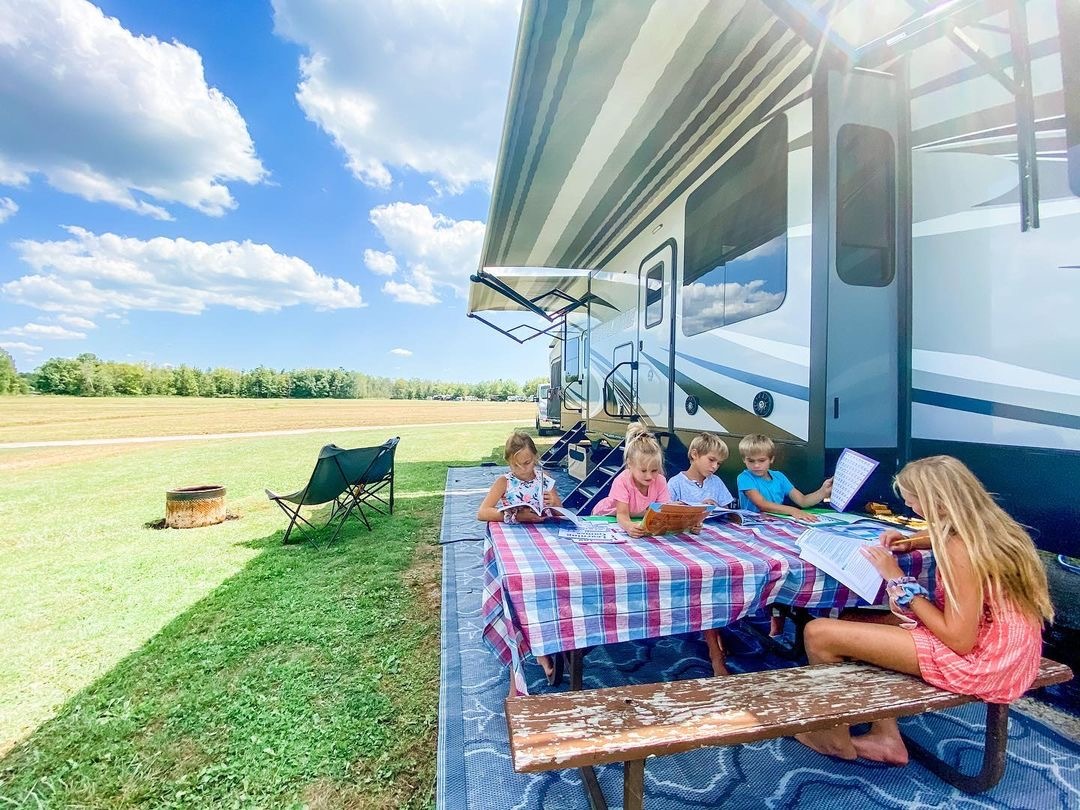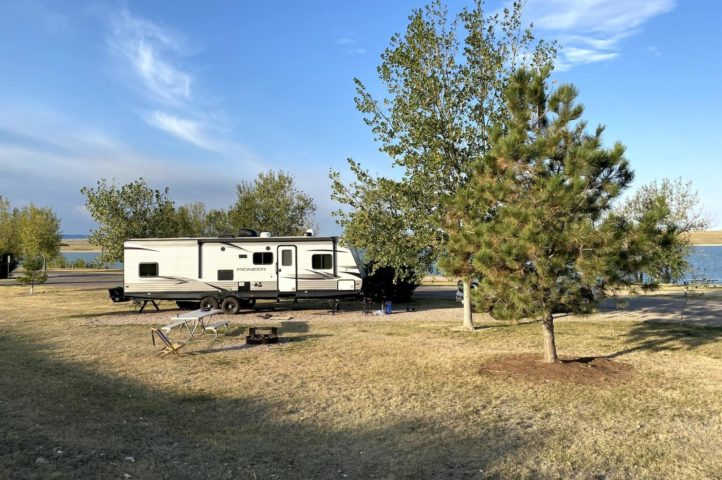If the pandemic taught us anything, it’s that many people can do their jobs, and their homeschool work, remotely. And through the normalization of remote work, many people are choosing jobs where they can not just work from home, but work from home on the road – their RVs. Whether you’re a remote employee, an online business owner, homeschooling or something else, we’ve got some pointers for anyone who wants to make a killer RV mobile office.
RV MODELS AND FEATURES
Travel Trailers With Separate Spaces
If you’re just starting out, the right model RV can massively improve your remote work success. There are some luxury RVs with home offices, which can make quick work of setting up your workspace. Even without a dedicated home office, other luxury RVs may offer space you can adapt to use as an office.
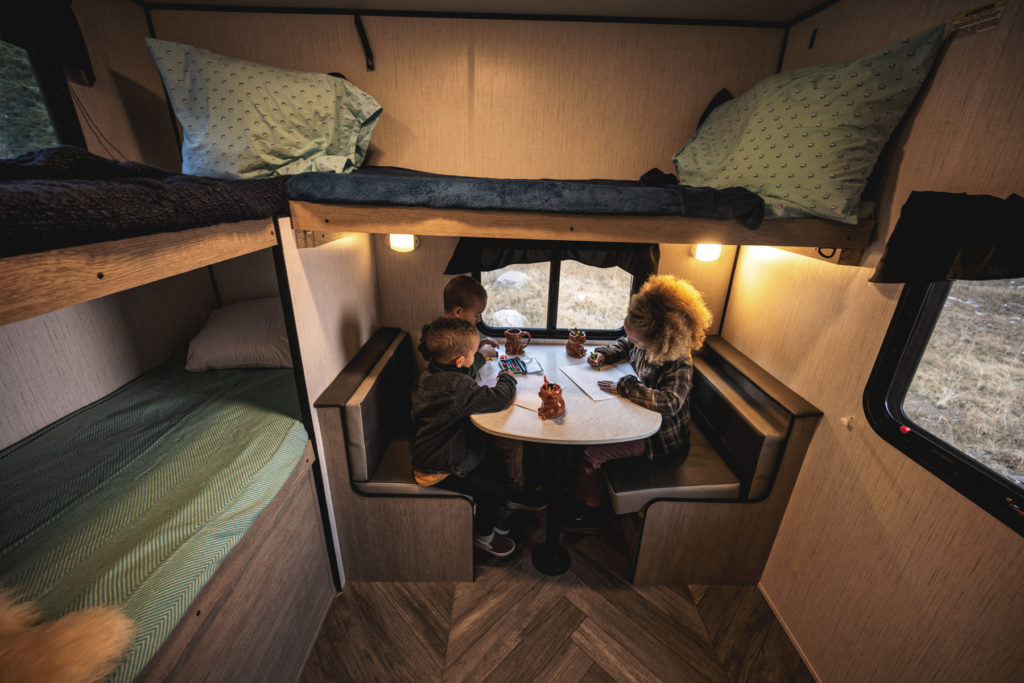
Prowler 303BH
Having a dedicated room to work in can provide benefits like privacy and silence. Look for models with distinct spaces, such as two- or three-bedroom RVs. RVs with garage spaces or bunk rooms allow you keep other people and distractions out during phone calls or video meetings. Models like Sundance 291QB, North Trail 33BKSS and Prowler 303BH all include a separate bunkhouse room behind a closed door. Another bonus: these models also include a second dinette table in the bunkhouse, which functions as a built-in desk.
Create Versatility with Toy Haulers
Toy haulers can work well for remote work, too. With garages designed to provide maximum floor space, there’s plenty of room to customize your RV interior with DIY office solutions. It would be easy to set up a folding desk or two during the day and stow them away at night. Many toy haulers have double fold-down sofas in the garage that transform into dinettes with the addition of a folding table. Models like the Torque T26, Torque T281, Lithium 2714 or Pioneer RG26 all feature generous garage space with fold-down sofas and movable dinette tables.

Torque T281
If you’re camping in reliably nice weather, toy haulers have ramps you can turn into an indoor-outdoor patio with a simple kit. Depending on the patio kit, you may get an awning, rails, full screens, or a tent-like contraption that provides walls and shelter while allowing free flowing fresh air. A toy hauler patio can make it easy to work outside, keep kids or noisy pets happy but safely corralled, or allow your RV occupants to spread out to improve productivity. All our toy haulers have optional patio kits you can purchase to make the most of that space.
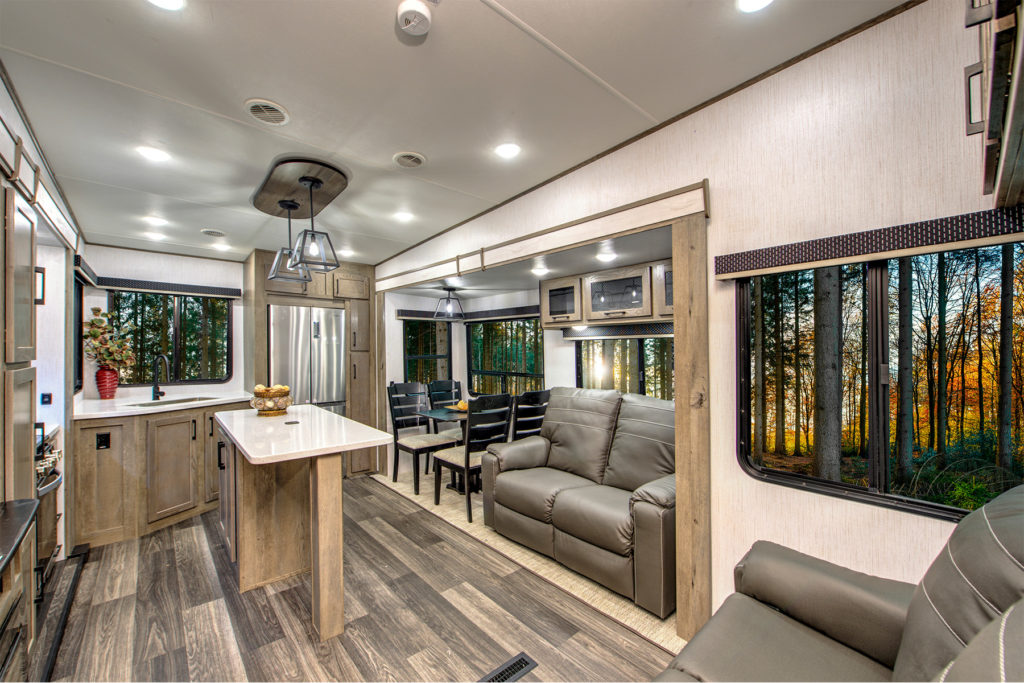
Elkridge 32RK
Finally, if toy haulers, bunkhouse models and luxury RVs are outside your budget at the moment, look for models that may have clever RV interior features you can convert to bonus work spaces. Look for things like kitchen islands with space for bar stools (Elkdridge 32RK), spacious booth dinettes (North Trail 26DBS), and floor plans with open floor space where you can set up your own table or desk (Mallard M263RK).
STAYING CONNECTED
In any RV, getting a strong Wi-Fi or cell signal can be a constant struggle. Some of the most restful, scenic places in the country just happen to be far away from any cell phone towers. But don’t despair – there are lots of options to help you stay productive, no matter where you park.
Wi-Fi Options
Gadgets like the Winegard Gateway can provide pre-installed high-performance 4G LTE antennas that guarantee you’ll have internet access from nearly anywhere. Most major cellular carriers can also offer WiFi hotspot capability, which turns your smartphone or separate MiFi device into a makeshift wireless router. There are also satellite internet providers like Starlink, but you’ll need a wide-open view of the sky in order to get a clear connection with your satellite dish.
While there are more options than ever for staying connected to the internet on the road, they all have unique benefits and drawbacks. Your best bet is to plan ahead and always have a plan B. If you have an important meeting, research your destination ahead of time to check the signal strength. You can always book a spot at a more reliably-connected campsite, or plan to swing by a coffee shop for that block of time.
PLAYING IT COOL
Even if everyone you work with knows you’re traveling in your RV, you’ll probably want to play it cool by minimizing overt distractions in meetings. For instance, if you work in front of a window, you don’t want to jump on Zoom and have everyone watch your kid play fetch with your dog through the glass. Entertaining, but distracting! Many video meeting rooms have virtual backgrounds you can use, so you can disguise your surroundings when you need to.
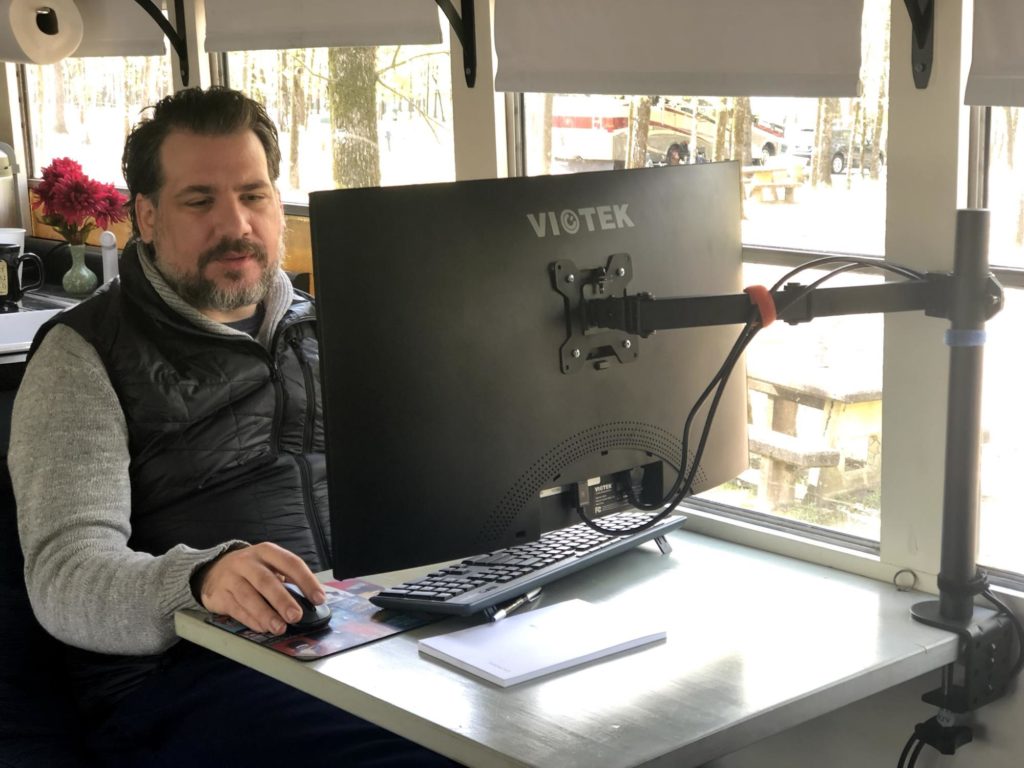
If you have a spot where you can take video calls in front of a blank space, you can always create your own custom background. Stick some artwork to a blank wall or artfully arrange a vase or some books on a surface behind you. A little pre-planning can make your background look like a typical home office – which could keep the attention off your (way more fun) circumstances if it might cause jealousy.
WHEN IN DOUBT, ACCESSORIZE
There’s big money in the field of ergonomics, and for good reason. Working in a sub-optimal position for hours on end can leave you feeling stiff, at best, and in pain, at worst. While an Aeron chair may not be realistic, there are plenty of other solutions to make your impromptu workspace more comfortable.
If you have a desk space but short legs, look into a small tilted footrest to keep you sitting straight and tall while you work. A wireless mouse and keyboard can help you position your laptop on an eye-level riser while keeping your arms resting flat on a surface. And if you prefer to move around during the day, look into standing desks. You can DIY one with a folding desk on an existing dinette surface, or you can buy a desk that’s built to break down easily for storage.
A good pair of noise-canceling headphones can protect your focus when you don’t have an office door. You can even get noise-canceling earbuds that help sift out background noise when you’re on a call.
Working outside takes a bit of preparation, but there’s nothing like spending all day in the fresh air. If you have an awning, plan on setting that up to provide plenty of shade for your computer screen. No awning? No problem. You could try a laptop hood or sun screen, a portable patio umbrella, a pop-up gazebo canopy, or an anti-glare screen for your computer. And you can always pair a comfortable camp chair with a folding desk to create a comfortable workstation outdoors.
BALANCING WORK AND PLAY
Things To Consider
One of the benefits of working from the road is being able to close your computer at quitting time and head straight out for an adventure. But why not plan for restorative breaks as well? An hour lunch break can provide plenty of time to eat and stretch your legs. You might take a quick hike, go for a dip in a nearby lake, walk the dog, or play with your kids at a campsite playground. Interspersing hardcore focus with breaks that get you moving is great for your physical and mental health.
If you’re working from a different time zone than the rest of your team, you might consider working the same hours they do. That can provide either a later start in the morning (great for getting that morning run in) or an early end to your day (with plenty of time for some summer paddle-boarding before or after dinner).
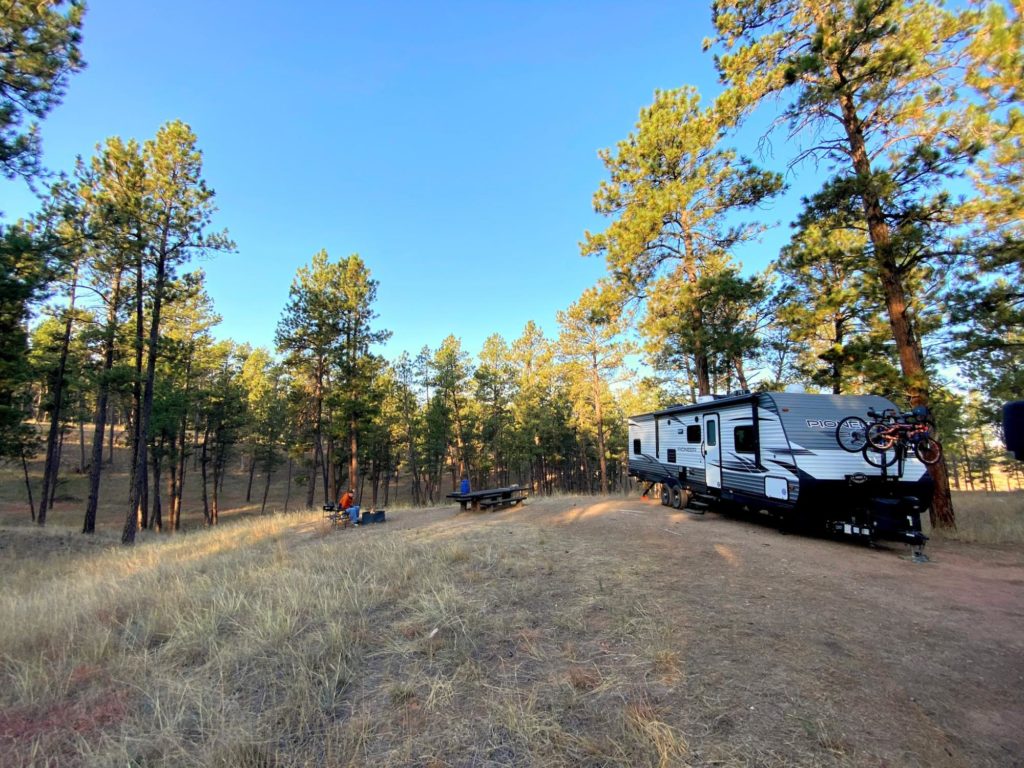
Utilize Travel Days
When it comes to packing up and moving your RV, we recommend you plan carefully. A long drive followed by campsite setup can take a lot out of you. Planning to drive and move early and then work in the afternoon is tough. You might already be worn out and ready for some R&R. You also don’t want to pull-over to take an important call only to realize too late that your connection is non-existent.
We recommend planning your travel days for evenings and weekends. If you can get to your next destination before it gets too dark to set up, traveling in the afternoon/evening can work. But the absolute safest bet is to plan your travel days for your days off, which ensures you have the time you need to move without stress.
And that may necessitate moving locations less often than you would on vacation. But hey when you can work from anywhere, what’s the rush, right? Take your time at each destination, give yourself plenty of time to explore outside of work hours, and save yourself unneeded stress by only moving once every week or two, if you can.
With these tips for working from your mobile RV home office, you’ll be well on your way to creating a workspace where you can get things done. So, what do you think? Do you work remotely from your RV? What are your favorite gadgets, furniture and accessories for staying productive while you’re on the road?
